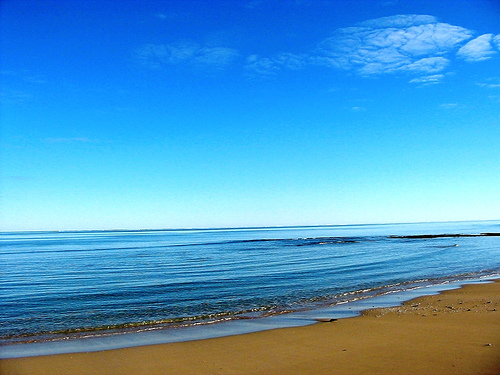
Stephan Edgar - Netweb/Flickr
We live on a watery planet, and though we have feet not fins, we are far more dependent on the oceans than you might imagine. On World Oceans Day, whether you live in Miami Beach or Miami, Ohio, it would pay to reflect on all that our seas provide and how we can repay the many favors.
On a recent expedition to the Solomon Islands, I was surprised to learn that the unemployment rate was close to 80 percent. How could that be, when people seemed to live relatively well? Turns out that most get what they need from the oceans. For Solomon Islanders, their protein comes from the seas, coral becomes building blocks, shells are trade goods and an important eco-tourism industry is developing around spectacular dive sites. Everyone I met had a direct connection to the sea.
Living in Missoula, Montana, I miss that direct access to the sea that island life provides. But, even here -- hundreds of miles from the coast, the ocean's influence manages to reach me.
Our local weather is a delayed mimic of what happens on the coast. This year in particular, the cyclical cooling and warming of the Pacific that produces periodic La Nina years dumped record amounts of snow. A friend skinned up and then skied down a local mountain -- in June!
We can grow cherries here because of the regulatory temperance provided by the ocean, giving us mild winters; a mini "banana belt" if you will.
The sardines and salmon I eat once or twice a week are from the Pacific. Around the world, over 15 percent of our high-quality protein comes from the oceans -- which also provide the primary and often only source of protein for one billion people.
Within my home, products too many to comprehensively list contain an additive derived from seaweed that acts as an emulsifier and gives consistency to otherwise clumpy products. The extract, carrageenan, is found in a surprising number of everyday products like peanut butter, cosmetics and toothpaste. (Toothpaste actually is mostly chalk - the prehistoric remains of ancient shelled sea creatures -- with the perfect grittiness to polish teeth without grinding them down.)
The shampoo I used this morning contains kelp, the yogurt in the fridge has agar from seaweed, the salad dressing for lunch has algin from brown algae and the sunblock I use religiously was developed from a coral reef critter.
From allergy medicines to chocolate milk, little things that make our everyday life a bit more enjoyable come, without fan-fare, from the oceans.
What's concerning is that our oceans and coasts are not in great shape. For too long, our oceans have been a silvery mirror to hide our waste and an endless wilderness to plunder.
If we want to take for granted all that the oceans give us, we need to grant the oceans something in return. On World Oceans Day, here are five things you can do on behalf of our seas.
- Eat the Right Fish, Caught the Right Way: If you live near the ocean, look in your area for a community-supported fishery. Here you can purchase shares in fresh, locally caught seafood. Further inland, keep up-to-date on the best choices in fish while you shop or eat out.
- Speak Up: Contact your representatives and tell them to support the National Endowment for the Oceans, a bipartisan effort to protect our coasts and expand our marine-based economy.
- Cut Out Single-Use Plastics: One-time use items end up in oceans, where they aggregate in giant ocean gyres. Most Americans use hundreds of plastic bags, straws and cups. Just for one day, say no to single-use plastics. Invest in a reusable bag and keep it in your car for groceries.
- Adopt a Coral Reef (and Help Save a Life!): We are far more likely to get a new medical breakthrough in cancer, diabetes and Alzheimer's disease treatments from our ocean than from land. But if we lose our reefs, we not only lose valuable habitat for fish, but also the life-saving compounds them may contain.
- Reduce Your Carbon Footprint: The biggest long-term threat to the oceans is acidification from climate change. As the oceans acidify, marine creatures find it harder to secrete shells, ultimately undermining the entire ocean food web. If you are not sure where to begin, start with assessing your carbon footprint, and then do ONE thing to cut it back a bit.
